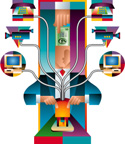Understanding and having a knowledge of Pareto’s law is not enough. The real challenge is having the discipline to apply it. It takes extraordinary effort to ignore the low priority task on your to do list each day. Staying focused on the high payoff tasks we all know will be the glue that makes dreams come true. Without realizing it, we are making it much more difficult than it needs to be. By engaging unproductive tasks that don’t involve thinking, just doing and trying to convince ourselves that we are making progress.
It was with great deal of delight that I read this article by Scott Berkun, someone who really gets it. In a world awash with an instant messaging, email and invasive Internet advertising and other attention grabbing issues it is becoming more and more difficult to maintain blinders and to give the deep level concentration that our most important activities really deserve. Berkun really makes a very simple argument against multi-tasking, particularly during those few moments we finally get to devote to those 80% tasks.
Maybe its time we rethink multi-tasking, a personal management technique that has begun to have “Holy Grail” status amongst productivity gurus lately.
This is a must read on for all of you are seeking higher levels of personal productivity and performance. Here are the passages that I highlighted while I was reading it:
| “ | Your obituary will not list the hours you fought off boring meetings or ignored your friends by reading forgettable blurbs about forgettable things on your cell phone or laptop. The wise and happy throughout history have found ways to avoid situations that demand divided attention.There isn’t a single great work in the history of civilization, no novel, symphony, film, or song that was completed as a 1/5th time-slice between e-mail, IM, cellphones and television.It’s knowing what to ignore that makes us successful, not how many volumes of data we can consume at the same time.We’re supposed to be in a golden age of leisure time since most hard labor is done for us, but somehow we’ve fallen into a place where time gained from innovations falls away like sand between our hands, phones and keyboards. The truth knocks on the door and we say, “Go away. I’m looking for the truthIf you only spend a fast food amount of attention, you will never have a 5 star dining experienceTo quote Pirsig, “The truth knocks on the door and we say, “Go away. I’m looking for the truth”. In the race to clean out inboxes and scratch items off the to-do list, we miss chances to find the thing we’ve created the inbox and to-do list for.We are information insecure. The compulsion for more is driven by lack of confidence in what we already have. Out of a secret kind of fear we are convinced that the next e-mail or link is better than the one we’re reading now.Reclaiming attention starts with a leap of faith in believing the following sentence: you do not need more than what you have. |
,, |
Read the entire article

